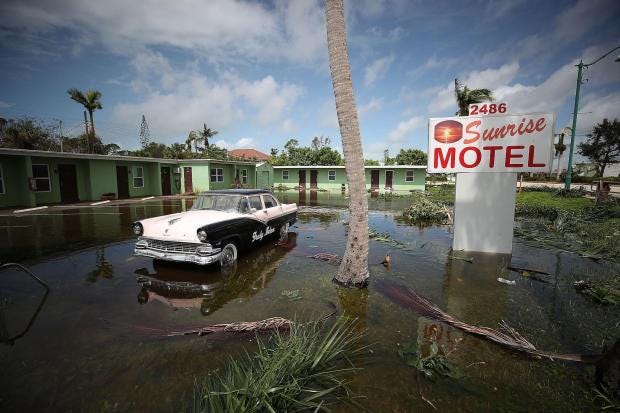Friday, September 15
Harvey And Irma: This Is How Hurricanes Get Their Names
The late summer news has been dominated by hurricanes in the Caribbean and the Gulf of Mexico: first there was Hurricane Harvey, which caused devastating flooding in the US city of Houston, Texas, and now Hurricane Irma has wheeled through the Caribbean and will strike Florida over the weekend.
One of the questions that have arisen has concerned the naming of the hurricanes. Why Harvey? Why Irma?
The task of naming the storms falls upon the World Meteorological Organisation, the highest authority of weather experts in the world, who meet on a regular basis to discuss the patterns of
weather and the effects that extreme weather have.
They have created zones in which regional organisations under their auspices pick the names: Atlantic hurricanes such as Harvey and Irma are named by the United States National Hurricane Center.
When they name hurricanes and tropical storms, they go through a list of accepted names, both male and female, before choosing one.
They begin at A as the hurricane season begins, working through the Latin alphabet. If there are more than 21 hurricanes in one season, they move on to the Greek alphabet. They alternate between male and female names while skipping the letters Q, U, Y and Z.
Hurricane names can be retired if they are suitably catastrophic or destructive. Hurricane Mitch, the second deadliest Atlantic hurricane ever, killed over 10,000 people in Honduras and Nicaragua in 1998 and resulted in the name Mitch being taken from the register permanently. It was replaced by Matthew, though that again was retired after 2016's Hurricane Matthew which struck Haiti.
It is as yet unclear whether the names Harvey and Irma will end up retired.
Previously, hurricanes were named after the places where they struck - the Galveston hurricane of 1900, for example - or the day on which they occurred, usually using the Saints Day that was most appropriate, such as the Santa Ana hurricane that struck Puerto Rico in 1825.
It isn't always so serious: in Scotland in 2011, an extratropical cyclone (as hurricanes can be known in non-tropical areas) was named Friedhelm by weather authorities but was popularly known as Hurricane Bawbag after the Scottish dialect word for 'scrotum' or more idiomatically, for a coward.
While it was initially a joke trend on Twitter, it later was used by authorities and widely in the media, with politicians mentioning in Parliament
Source: Ladbible.com
Popular Tags:
Latest-News
Subscribe to:
Post Comments
(
Atom
)
Trending News
-
A ‘suya’ meat seller in Enugu State was weekend nabbed while reportedly stealing meat from a butcher’s shed at the popular Ogbete main mar...
-
Father Chibuike Okpala Fears has been spread in the streets of kubwa village in Abuja, as a priest was found half dead in the early morn...
-
The school children were caught dancing provocatively while twerking Many people have reacted angrily after school chidren were caught o...
-
On Wednesday , dozens of people took over the streets of Venezuelan capital in Caracas calling for the government of President Nicholas ...
-
A very gigantic snake that was suspected to have eaten a calf, has been killed by some locals. The locals were amazed to find out that t...
-
24 year-old Anastasia Deeva appointed as Deputy Minister on European integration of Internal Affairs of Ukraine A newly appointed 24-...
-
Blac Chyna posted her bathroom selfie flaunting her figure on her instagram page and just an hour later, her baby daddy's ne...
-
This woman who was reportedly intoxicated with drugs and alcohol, have been captured on camera in the streets of New York, twerking n*ked ...
-
Did you know that if you’re using tobacco, you may develop this kind of cancer? This cancer may also trigger when your family has a histor...
-
West African countries' leaders are in Niamey, Niger Republic, for talks on the proposed single currency for the Economic Community of...














No comments :
Post a Comment